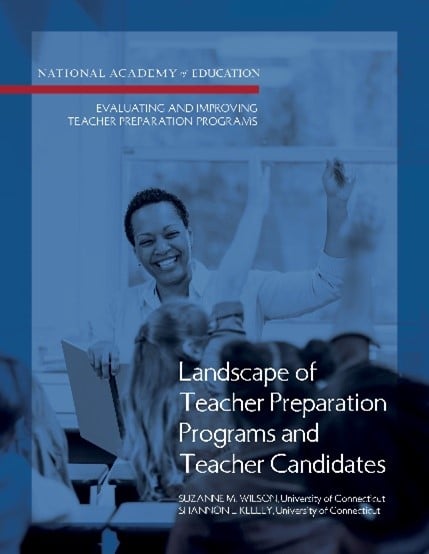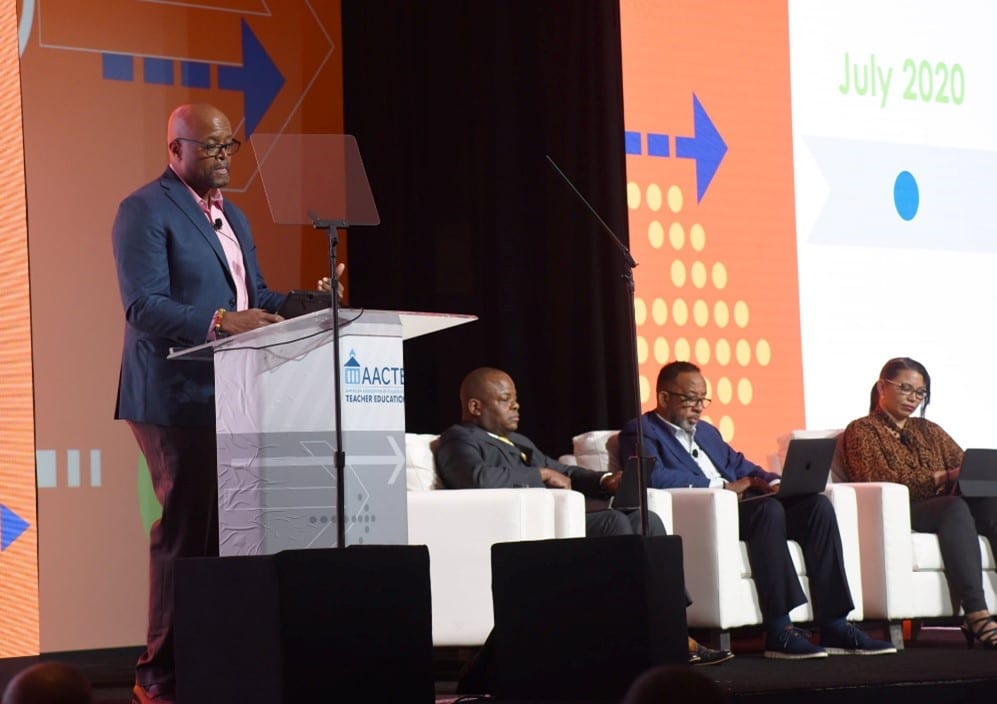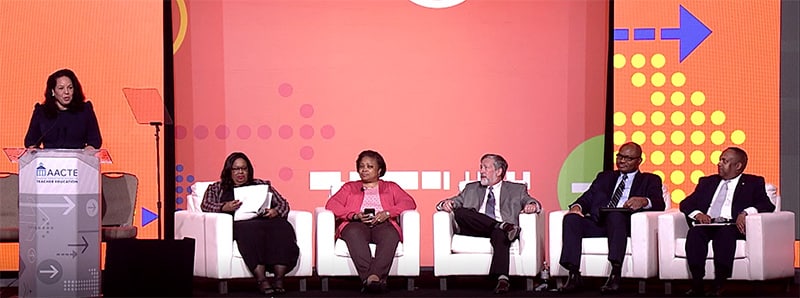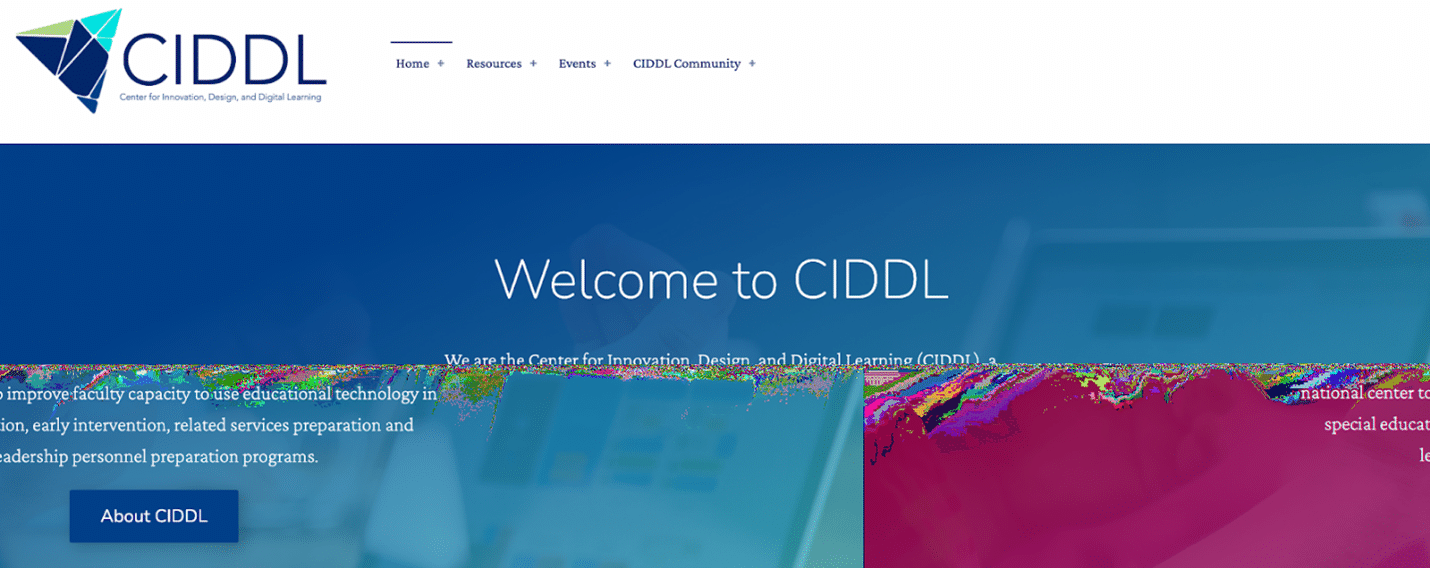11 Apr2022
By Dian Dong
Prior to the COVID-19 pandemic, teacher preparation programs, as well as key stakeholders such as states, accreditation bodies, and teacher unions and organizations, were grappling with shifting demands on teachers and consequently on teacher education. The pandemic has led to deepening staffing shortages exacerbating the needs of PK-12 schools and thus placing increased pressures on teacher preparation programs (TPPs) to creatively address the needs. As TPPs and stakeholders seek to address quality teacher preparation in these changing times, it is critical to understand the landscape of TPPs, teacher candidates, and TPP evaluation systems. The National Academy of Education (NAEd) just released two commissioned papers that specifically target these questions.
 In Landscape of Teacher Preparation Program and Teacher Candidates, the authors Suzanne Wilson and Shannon Kelley discuss the contemporary teacher preparation landscape and the teacher candidates attending those programs. After providing an overview of the changing landscape of TPPs in the past three decades, the authors describe what is known about the teacher candidates who attend TPPs, including their demographics, academic ability, and motivations to teach. Given the need to attract new teachers, the authors offer a comprehensive synthesis of programmatic and policy approaches to recruiting and retaining new teacher candidates. The paper concludes with implications for policymakers, educators, teacher educators, and researchers as we face potential teacher shortages in the coming years.
In Landscape of Teacher Preparation Program and Teacher Candidates, the authors Suzanne Wilson and Shannon Kelley discuss the contemporary teacher preparation landscape and the teacher candidates attending those programs. After providing an overview of the changing landscape of TPPs in the past three decades, the authors describe what is known about the teacher candidates who attend TPPs, including their demographics, academic ability, and motivations to teach. Given the need to attract new teachers, the authors offer a comprehensive synthesis of programmatic and policy approaches to recruiting and retaining new teacher candidates. The paper concludes with implications for policymakers, educators, teacher educators, and researchers as we face potential teacher shortages in the coming years.
11 Apr2022
By Jacqueline Rodriguez
AACTE will facilitate a webinar, “Educator Preparation Innovation: Creating Pathways to Strengthen Recruitment,” on Tuesday, April 19. The virtual session is part of the Council for Exceptional Children (CEC) and the CEEDAR Center 12-part webinar series focused on evidence-based strategies to strengthen and diversify the special education workforce.
According to multiple research studies, fully prepared teachers in special education are more effective and are more likely to remain in the teaching profession than are teachers who are not fully prepared. It is clear that public schools need fully prepared and credentialed special education teachers.
05 Apr2022
By Tommy Silas

The white folk of Altahama voted John a good boy, – fine plough-hand, good in the rice-fields, handy everywhere, and always good-natured and respectful. But they shook their heads when his mother wanted to send him off to school. “It’ll spoil him, – ruin him,” they said; and they talked as though they knew. (W. E. B. Du Bois, 1903/2015, p. 173)
This excerpt is a great representation of the fear fueling the push behind the call for censorship of critical race theory (CRT) and stages the focus of a Deeper Dive session at the AACTE 2022 Annual Meeting for educators to discuss how to address some of the challenges related to the threat that banning CRT has on American democracy. The “AACTE and AERA joint session: Youth, Censorship, and Academic Freedom” was moderated by Marvin Lynn (Portland State University), and the panelists were Michael Dantley, (Miami University) Kimberly White-Smith (University of La Verne), and Jacob Easley (Touro College). The discussion started with recapping the timeline of efforts to constrain teaching about race in higher education, followed by organizing faculty and staff, the role of education leaders in advancing social justice, and how to work with state and national organizations to address issues of education and censorship.
05 Apr2022
By Thelma Quardey Missedja

The “Minority Serving Institutions as Drivers of Educational Equity” Deeper Dive session at this year’s Annual Meeting provided insight on the essential role minority serving institutions (MSIs) play in providing postsecondary access to students of color, preparing diverse educators for the workforce, and increasing the economic mobility of low-income, first-generation college students. The session focused on unique programs, supports, and partnerships that these institutions offer to attract and prepare diverse teachers. The panel for the session included deans from four MSI schools or colleges of Education: J. Fidel Turner (Clark Atlanta University), Chinaka DomNwachukwu (California State University-San Bernardino), Stephen Silverman (Florida Atlantic University), and Denelle Wallace Alexander (Norfolk State University).
05 Apr2022
By Matthew Wales

What’s new at AACTE’s 2022 Leadership Academy? In response to requests for tailored programming, AACTE will offer its high-quality leadership training in two distinct program sessions—one for new chairs and academic leaders, the other for new and seasoned deans.
With a focus on advancing diversity, equity, and inclusion, both sessions explore critical components of academic leadership. Attendees will understand the complex roles and functions of their positions while building key leadership skills and forging networks with other professionals in similar leadership roles.
04 Apr2022
By Jacqueline Rodriguez
The U.S. Department of Education invites you to join the Strengthening Partnerships Between States, School Districts, and Higher Education to Increase the Number of Teacher Candidates Prepared to Enter the Classroom and Provide Immediate Support to Schools Webinar. The webinar will be held Thursday, April 7 from 3:00 – 4:00 p.m. EDT
As states, districts, and schools are working hard to address the impact of COVID-19 on students’ social, emotional, mental health, and academic needs, many of them are facing significant challenges in attracting and retaining teachers. Preexisting teacher shortages in critical areas such as special education; bilingual education; science, technology, engineering, and math; career and technical education; and early childhood education have only been further exacerbated by the COVID-19 pandemic — directly impeding student access to educational opportunity. Research shows that shortages disproportionately impact students of color, students from low-income backgrounds, students with disabilities, and, often, rural communities.
During this roundtable we will
- Discuss the U.S. Department of Education’s call to action for states, institutions of higher education, and school districts to commit to using American Rescue Plan and other federal relief funds to help address teacher shortages.
- Share how federal relief funds and opportunities through the U.S. Department of Labor can and are being used to address teacher shortages and provide support to schools by establishing or scaling up teaching residency and apprenticeship programs.
- Hear from states increasing their investments in a diverse educator pipeline and from educator preparation programs at institutions of higher education that a re partnering with districts to scale up their programs and leveraging their residency and apprenticeship programs to provide immediate support to schools.
AACTE Participation
AACTE’s vice president for research, policy, and advocacy, Jacqueline Rodriguez, will present a national perspective on the ongoing educator shortages and promising practices to address them. Two of AACTE’s member institutions, Virginia Commonwealth University (VCU) and University of Northern Colorado (UNCO), will present their work during the roundtable. Andrew Daire, dean of College of Education at VCU, and Corey Pierce, professor at UNCO, will discuss how they are increasing recruitment of diverse learners to their education programs.
If you are interested in joining this roundtable, register and please submit any questions you would like to have answered during the conversation. After you register, you will receive a Zoom link to join the meeting on Thursday, April 7 from 3:00 – 4:00 p.m. EDT.
04 Apr2022
By Kaitlyn Brennan
This weekly Washington Update is intended to keep members informed on Capitol Hill activities impacting the educator preparation community. The views expressed in this post do not necessarily reflect the views of AACTE.
 The Biden-Harris Administration FY2023 Budget Proposal is here and again provides substantial increases for education funding. Your voices are being heard.
The Biden-Harris Administration FY2023 Budget Proposal is here and again provides substantial increases for education funding. Your voices are being heard.
Biden-Harris Administration Unveils FY2023 Budget Proposal
On Monday the White House unveiled the complete version of the Biden-Harris Administration’s full budget proposal for FY2023. The proposal comes just weeks after the President signed into law the $1.5 trillion FY2022 omnibus spending bill, avoiding a full year continuing resolution at the FY2021 levels.
The budget proposal calls for $88.3 billion in discretionary funding to the Department of Education- a $12.9 billion or 17% increase over the 2022 net enacted level.
04 Apr2022
By David Fuentes
This article was originally published in Teachers College Record and is reprinted with permission.
There are deeply ingrained structural inequalities in schools that require immediate action. As antiracist educators, we must ask questions about school equity to disrupt the inequality of school outcomes we continue to see today. Who teaches the students? Who gets new schools? Who graduates from high school, and who goes to college? Who gets labeled and sorted? What can (antiracist) educators do? These questions are profoundly antiracist because they are overwhelmingly multicultural. By asking profoundly antiracist questions about schools today, I highlight areas and issues of schooling that require immediate action, antiracist efforts, to address the inequalities that exist as evidenced by educational statistics. Based on the analysis of school outcomes presented in this research note, it becomes clear that Black, Indigenous, People of Color (BIPOC) students continue to experience disparate school outcomes in America. Such inequalities reveal that BIPOC children are taught by underpaid teachers, learn in schools that are falling apart, are labeled and sorted at disproportionate rates, and endure a curriculum about other people, and generally are being underserved in schools, as evidenced by the school outcomes. Educators must take immediate antiracist actions to ensure that school equity does not continue to be defined by racial inequality.
04 Apr2022
By Weade James
 AACTE in partnership with the University of Florida Literacy Institute (UFLI) invites faculty and in-service teachers to share their experiences relating to literacy development and effective reading instruction. In 2019, 35% of grade 4 and 34% of grade 8 students scored at or above proficient on the National Assessment of Educational Progress (NAEP), a decline since 2017. The longstanding reading achievement gap has been further exacerbated by the COVID-19 pandemic, leading to a growing number of states sounding the alarm on solutions to increase literacy development and reading proficiency in students.
AACTE in partnership with the University of Florida Literacy Institute (UFLI) invites faculty and in-service teachers to share their experiences relating to literacy development and effective reading instruction. In 2019, 35% of grade 4 and 34% of grade 8 students scored at or above proficient on the National Assessment of Educational Progress (NAEP), a decline since 2017. The longstanding reading achievement gap has been further exacerbated by the COVID-19 pandemic, leading to a growing number of states sounding the alarm on solutions to increase literacy development and reading proficiency in students.
04 Apr2022
By Janae Blanscet

As AACTE works to revolutionize education and combat divisive issues arising throughout the country, educator preparation is essential to our efforts. Now more than ever, your association needs committed, talented, and thoughtful leaders.
Are you ready to assume a leadership role in the national educator preparation community, or do you know someone who is? Nominate yourself or a colleague by April 30 to serve on the AACTE Board of Directors or a programmatic advisory committee.
04 Apr2022
By Laura S. Hamilton and Ace Parsi
“Educators are actually our nation’s first responders for democracy,” said Jacqueline Rodriguez, AACTE vice president, policy, advocacy, and research, at the Educating for American Democracy and ETS Symposium.
Our democracy is facing deep challenges that demand an educational response. The Educating for American Democracy (EAD) Roadmap responds to this challenge, not through answers, but rich questions that animate the underlying themes and tensions of our democracy, ensuring students develop key civic capacities while engaging in civil discourse and civic friendship. The EAD Roadmap was the product of collaboration among more than 300 academics, historians, political scientists, K–12 educators, district and state administrators, civics providers, students and others representing viewpoint, professional and demographic diversity. Now in its implementation phase, the EAD initiative represents a call to action for investments in strengthening history and civic learning, and to ensure that civic learning opportunities are delivered equitably throughout the country.
04 Apr2022
By Ling Zhang

The Center of Innovation, Design, and Digital Learning (CIDDL) is seeking voices and inputs about innovative use of technology in teacher preparation programs from all AACTE members.
CIDDL is the Office of Special Education Programs (OSEP)’s funded center focused on increasing the capacity of faculty to use educational technology in special education, early intervention, related services personnel preparation, and leadership personnel preparation programs.
29 Mar2022
By Amy Painter, Ed.D. and Tammy T. May
AACTE member alumnae working in the field, share tips on self-care for educators.
When it comes to self-care, we wonder if teachers and administrators even know what they need. Giving themselves permission to let go and be free to relax, enjoy the great outdoors, and literally do nothing is paramount. However, sometimes feelings of guilt override self-care, as educators think they “need” to get schoolwork done, grade papers, complete lesson plans, or prepare creative and engaging activities.
29 Mar2022
By Laura Mogelson
 I serve as the legislative liaison for the Minnesota Association of Colleges for Teacher Education (MACTE), a consortium of over 20 public and private institutions of higher education. We represent both urban and rural geographic regions and we range in size. In Minnesota, we are unique in that the governor is a democrat, the house is majority democrat, and the senate is majority republican.
I serve as the legislative liaison for the Minnesota Association of Colleges for Teacher Education (MACTE), a consortium of over 20 public and private institutions of higher education. We represent both urban and rural geographic regions and we range in size. In Minnesota, we are unique in that the governor is a democrat, the house is majority democrat, and the senate is majority republican.
Prior to the launch of the Minnesota legislative session, MACTE developed collaborative legislative priorities that guide our work with the legislature. This year our four main goals are 1) to maintain high quality teacher preparation standards and support initiatives that reflect the research base around teaching methodologies; 2) increase the diversity of the Minnesota teaching force through strategies to recruit, support, prepare, and retain teachers of color; 3) to improve the retention of teachers; and 4) to support high-quality research-based E-12 instructional practices. In my work as the liaison, I attend committee meetings and advocate our support (or opposition) to proposed legislation through written or oral testimony. I am often supported by our MACTE leadership, our faculty who are content area experts, and our teacher candidates.
29 Mar2022
By Michael Rose
 President Biden released his fiscal year 2023 budget proposal this week, which calls for an increase of $15.3 billion or roughly 15% for the Department of Education compared to fiscal year 2022. AACTE strongly supports the investments in education programs called for by the president, which will make college more affordable for millions of students, help address the teacher shortage that our country faces, and diversify the profession.
President Biden released his fiscal year 2023 budget proposal this week, which calls for an increase of $15.3 billion or roughly 15% for the Department of Education compared to fiscal year 2022. AACTE strongly supports the investments in education programs called for by the president, which will make college more affordable for millions of students, help address the teacher shortage that our country faces, and diversify the profession.
 In Landscape of Teacher Preparation Program and Teacher Candidates, the authors Suzanne Wilson and Shannon Kelley discuss the contemporary teacher preparation landscape and the teacher candidates attending those programs. After providing an overview of the changing landscape of TPPs in the past three decades, the authors describe what is known about the teacher candidates who attend TPPs, including their demographics, academic ability, and motivations to teach. Given the need to attract new teachers, the authors offer a comprehensive synthesis of programmatic and policy approaches to recruiting and retaining new teacher candidates. The paper concludes with implications for policymakers, educators, teacher educators, and researchers as we face potential teacher shortages in the coming years.
In Landscape of Teacher Preparation Program and Teacher Candidates, the authors Suzanne Wilson and Shannon Kelley discuss the contemporary teacher preparation landscape and the teacher candidates attending those programs. After providing an overview of the changing landscape of TPPs in the past three decades, the authors describe what is known about the teacher candidates who attend TPPs, including their demographics, academic ability, and motivations to teach. Given the need to attract new teachers, the authors offer a comprehensive synthesis of programmatic and policy approaches to recruiting and retaining new teacher candidates. The paper concludes with implications for policymakers, educators, teacher educators, and researchers as we face potential teacher shortages in the coming years.









 The Biden-Harris Administration FY2023 Budget Proposal is here and again provides substantial increases for education funding. Your voices are being heard.
The Biden-Harris Administration FY2023 Budget Proposal is here and again provides substantial increases for education funding. Your voices are being heard. AACTE in partnership with the University of Florida Literacy Institute (UFLI) invites faculty and in-service teachers to share their experiences relating to literacy development and effective reading instruction. In 2019, 35% of grade 4 and 34% of grade 8 students scored at or above proficient on the National Assessment of Educational Progress (NAEP), a decline since 2017. The longstanding reading achievement gap has been further exacerbated by the COVID-19 pandemic, leading to a growing number of states sounding the alarm on solutions to increase literacy development and reading proficiency in students.
AACTE in partnership with the University of Florida Literacy Institute (UFLI) invites faculty and in-service teachers to share their experiences relating to literacy development and effective reading instruction. In 2019, 35% of grade 4 and 34% of grade 8 students scored at or above proficient on the National Assessment of Educational Progress (NAEP), a decline since 2017. The longstanding reading achievement gap has been further exacerbated by the COVID-19 pandemic, leading to a growing number of states sounding the alarm on solutions to increase literacy development and reading proficiency in students.

 I serve as the legislative liaison for the Minnesota Association of Colleges for Teacher Education (MACTE), a consortium of over 20 public and private institutions of higher education. We represent both urban and rural geographic regions and we range in size. In Minnesota, we are unique in that the governor is a democrat, the house is majority democrat, and the senate is majority republican.
I serve as the legislative liaison for the Minnesota Association of Colleges for Teacher Education (MACTE), a consortium of over 20 public and private institutions of higher education. We represent both urban and rural geographic regions and we range in size. In Minnesota, we are unique in that the governor is a democrat, the house is majority democrat, and the senate is majority republican. President Biden released his fiscal year 2023 budget proposal this week, which calls for an increase of $15.3 billion or roughly 15% for the Department of Education compared to fiscal year 2022. AACTE strongly supports the investments in education programs called for by the president, which will make college more affordable for millions of students, help address the teacher shortage that our country faces, and diversify the profession.
President Biden released his fiscal year 2023 budget proposal this week, which calls for an increase of $15.3 billion or roughly 15% for the Department of Education compared to fiscal year 2022. AACTE strongly supports the investments in education programs called for by the president, which will make college more affordable for millions of students, help address the teacher shortage that our country faces, and diversify the profession.